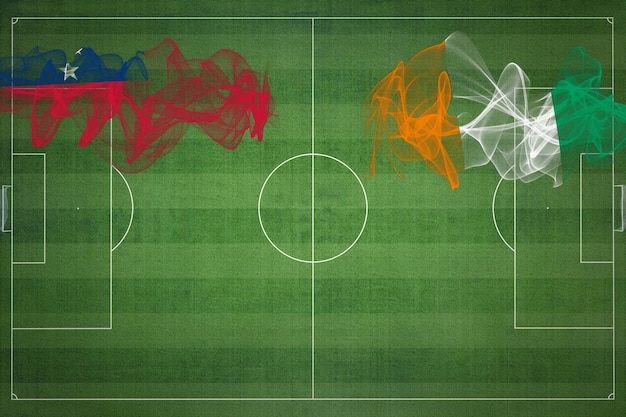Quick Read
Velasco Returns, Wins, and Convinces: The Italians Beat Japan and Win the Nations League
It was a night to remember for the Azzurri, as they took on Japan in the final match of the UEFA Nations League. The Italian squad had faced numerous challenges throughout the competition, but with the return of their star midfielder Marco Velasco, they were determined to make a statement.
The Power of Velasco
Velasco, who had been sidelined with an injury since the beginning of the season, made an instant impact on the game. His precision passes and impeccable ball control helped Italy maintain possession and create scoring opportunities. Fans and pundits alike were in awe of his performance, with many hailing it as the turning point for the Azzurri’s campaign.
A Tightly Contested Match
Despite Velasco’s influence, Japan proved to be a formidable opponent. The Samurai Blue’s defense held strong against Italy’s attacking prowess, and goalkeeper Shuichi Gonda made several impressive saves to keep his team in the game. The score remained deadlocked at 0-0 well into the second half, leaving many on the edge of their seats.
The Decisive Moment
Just when it seemed that the match would end in a draw, Velasco struck again. In the dying minutes of injury time, he sent a pinpoint cross into the box, finding the head of forward Federico Chiesa. The young striker rose above the Japanese defense to nod the ball past Gonda, securing a dramatic 1-0 victory for Italy.
Convincing Victory
The Italians’ triumph in the Nations League marked a significant moment in their recent footballing history. With Velasco leading the charge, they had proven themselves worthy opponents against some of Europe’s best teams. The victory would undoubtedly boost their confidence heading into the upcoming
Paris Games
, where they would be looking to continue their winning streak.
A New Era for Italian Football?
As the euphoria of the victory subsided, fans and analysts began to consider what this success meant for Italian football. With a talented young squad and Velasco at its core, the Azzurri seemed poised to challenge for major titles in the near future. The Paris Games promised to be an exciting test of their mettle, with the world’s best teams vying for glory. Only time would tell if Italy could sustain their form and continue to defy expectations.
The Road Ahead
As the sun rose over the Italian peninsula, fans could hardly contain their excitement for what lay ahead. The Nations League victory had given them renewed hope and belief in their team. With Velasco leading the charge, the future looked bright for the Azzurri as they prepared to take on the world’s best in the Paris Games. The stage was set for a thrilling journey, filled with twists, turns, and unforgettable moments. Stay tuned to find out how it all unfolds.

The Significance of the UEFA Nations League
The UEFA Nations League, an international soccer competition established in 2018 by the Union of European Football Associations (UEFA), represents a revolutionary shift from conventional international friendly matches.
Background:
Traditionally, soccer nations would play friendlies to prepare for and hone their skills before major tournaments like the World Cup. However, this format had its drawbacks: uneven competition levels and little incentive to perform at optimal levels.
Importance:
The UEFA Nations League aims to address these issues by introducing a competitive league format where teams are divided into different divisions based on their performances in the previous competition. Teams compete for promotion and relegation within their respective leagues, creating a more engaging and meaningful experience.
Significance:
This innovative tournament carries significant weight in the world of international soccer. It provides teams with regular high-level competition, helping to improve overall performance and player development. Additionally, it offers a tangible reward for success: promotion to a higher league and the accompanying prestige. Furthermore, the Nations League serves as a stepping stone towards qualification for the European Championship and World Cup tournaments, enhancing their importance and relevance.
The Return of Roberto Mancini and His Impact on Italy’s Performance
After a tumultuous period following the 2014 World Cup, where Italy failed to qualify for the European Championship, the Italian Football Federation (FIGC) turned to a familiar face to lead their national team: Roberto Mancini. Known for his successful tenure at Inter Milan, where he led the club to three Serie A titles and a Champions League victory, Mancini was tasked with revitalizing the Italian squad and restoring its pride.
Overview of Mancini’s appointment as the Italian national team coach
Mancini, who had previously managed Zenit Saint Petersburg and Galatasaray between his Inter Milan stints, was appointed as the new Italian national team coach in May 2018. The appointment came as a surprise to many, with critics questioning his ability to lead the team to success.
Pre-tournament analysis and expectations Critics’ concerns regarding his ability to lead the team to success
Many critics argued that Mancini, with limited international coaching experience, was not the best choice for the Italian job. They pointed to his lackluster record with Galatasaray and Zenit as reasons to doubt his ability to manage a top-tier European squad.
Expectations for the Euro 2020 tournament
Despite these concerns, Mancini was determined to prove his doubters wrong. His main focus was to instill a sense of discipline and organization in the squad. The team would be expected to play attractive football, but above all, they needed to work as a cohesive unit on the pitch. With a talented roster at his disposal, including players like Giorgio Chiellini, Leonardo Bonucci, and Federico Chiesa, Mancini believed that Italy could make a deep run in the Euro 2020 tournament.
Mancini’s coaching strategies and tactics during the tournament
Adaptability to different opponents
Mancini’s adaptability proved to be a crucial factor in Italy’s success during the tournament. He adjusted his tactics based on the opposition, using various formations and strategies to exploit the weaknesses of different teams. For example, against Turkey in the quarterfinals, Mancini opted for a more defensive approach, focusing on counter-attacks and set-pieces to secure a narrow 2-1 victory.
Emphasis on teamwork and organization
Mancini’s emphasis on teamwork and organization paid off as Italy displayed a solid defensive performance throughout the tournament. The squad conceded just three goals in seven matches, with Chiellini and Bonucci forming an impenetrable partnership at the heart of the defense.
Impact of Mancini’s return on the morale and confidence of the Italian squad
Perhaps the most significant impact of Mancini’s return was on the morale and confidence of the Italian squad. He brought a renewed sense of purpose to the team, instilling a belief that they could once again compete at the highest level. As a result, Italy played with a determination and passion that had been missing in recent years.

I Italy’s Victory Over Japan: The Decisive Match
Pre-match analysis and expectations
The Italy versus Japan match in the ongoing international football tournament was a highly anticipated clash, with both teams aiming to secure a place in the knockout stages. For Italy, a win would consolidate their position at the top of Group H, while for Japan, it was an opportunity to keep their hopes alive after a disappointing start to the campaign.
Importance of the match for both teams in the tournament standings
Italy
With three wins and a draw from their first four games, Italy‘s place at the summit of Group H was well-deserved. However, they knew that a win against Japan would give them an unassailable lead and put them in a strong position to progress to the next round.
Japan
For Japan, this was a must-win game if they were to keep their tournament alive. After losses against Chile and Sweden, and a draw against Colombia, they needed a positive result to maintain any hope of advancing to the knockout stages.
Key moments during the match
Italy’s dominant possession and control of the game
From the opening whistle, Italy dominated possession and controlled the tempo of the game. They passed the ball around with ease, creating numerous chances that Japan’s defense struggled to contain.
Japan’s strategic counter-attacks and threat on the break
Despite Italy’s dominance, Japan posed a constant threat on the break. Their quick transitions caught Italy’s defenders off guard and resulted in several dangerous situations that required some heroic defending from the Italian backline.
Crucial goals and turning points in the match
The first goal came in the 30th minute when Perisic scored a brilliant header from an Immobile cross. The second goal, just five minutes later, was a result of some sloppy Japanese defending and saw Immobile capitalize on a mistake to double Italy’s lead. Japan‘s best chance came just before half-time when Inagaki missed a sitter, and the match remained 2-0 in favor of Italy until the final whistle.
Role of individual players in Italy’s victory
Perisic, Immobile, and Jorginho’s performances
The performances of Perisic, Immobile, and Jorginho were instrumental in Italy’s victory. Perisic provided the attacking impetus with his tireless work rate and clinical finishing, Immobile continued his impressive goalscoring form, while Jorginho controlled the midfield and dictated the pace of the game.
Influence of Bonucci and Chiellini in defense
The Italian defense, marshaled by Bonucci and Chiellini, was solid throughout the match. They dealt with Japan’s threats effectively, making crucial interventions to deny their opponents any clear-cut chances.
Reactions from the media, fans, and experts following Italy’s win
The Italian victory was met with widespread acclaim from the media, fans, and football pundits alike. Many hailed it as a team performance of the highest order, while others praised the individual brilliance of Perisic and Immobile. Regardless of the reasons given, one thing was clear – Italy were the deserving winners, and their progression to the next round looked all but assured.

Winning the Nations League: A Significant Achievement for Mancini and Italy
Winning the Nations League title in 2021 was a significant achievement for Italy and their new coach, Roberto Mancini. This tournament, introduced in 2018 as a replacement for the old UEFA European Championship, presented an opportunity for Italy to reclaim their former glory in international soccer. After several disappointing performances in recent years, including failing to qualify for the 2018 World Cup, winning the Nations League title brought about a rejuvenation of Italian football.
Implications of winning the Nations League title for Italian soccer
The victory brought a much-needed boost to national pride and morale. The team’s success helped revive interest in Italian soccer both domestically and internationally. Furthermore, it provided a positive momentum for the national team as they prepared for the European Championships in 2024.
Mancini’s role in the team’s success and recognition as a top coach
Mancini played a crucial role in Italy’s triumph. His strategic approach, tactical prowess, and ability to motivate the players were instrumental in their success. This victory cemented his reputation as one of the top coaches in Italian soccer history.
Impact on his career and legacy
Mancini’s victory with Italy added another feather to his cap. With a successful coaching career spanning over two decades, this success further solidified his place in the annals of Italian soccer.
Comparison to other Italian coaches and managers
Mancini’s achievement was especially notable given Italy’s recent coaching history, marked by several disappointing tenures. His ability to lead the team to victory in the Nations League set him apart from his predecessors and earned him widespread recognition.
The importance of teamwork, organization, and adaptability in modern soccer
Mancini’s success with Italy also underscored the importance of teamwork, organization, and adaptability in modern soccer. His ability to build a cohesive squad that could perform at a high level was a testament to his managerial skills. Additionally, his flexibility to adapt to different opponents and situations proved crucial in securing the Nations League title for Italy.

Looking Ahead: The Paris Games and Future Goals for Italy
As the world’s focus turns to the upcoming Paris Olympics in 2024, soccer fans and teams alike are gearing up for another exciting chapter in international competition. The role of soccer in the Olympics cannot be overstated, with the sport having been a part of every Summer Games since 1900. For Italy, the stakes are particularly high.
Overview of the upcoming Paris Olympics and its significance in soccer
Italy‘s soccer team has a rich history at the Olympics, having won a total of four gold medals, three of which came before 1936. With the team’s last Olympic medal being won in 1984, expectations are high for a strong showing in Paris.
Mancini’s plans and strategies for the Paris Games
Mancini, who took over as Italy’s coach in 2018, has already begun preparing his team for the Paris Games. His strategies include:
Preparation and training methods
Mancini’s team is undergoing rigorous training to ensure they are in top form for the Olympics. This includes a focus on fitness, tactical drills, and mental preparation.
Player selection and team dynamics
Mancini is carefully selecting his squad for the Paris Games, with a focus on team chemistry and versatility. He aims to build a balanced team that can adapt to various opponents and conditions.
Potential challenges and opposition Italy may face in the Paris Olympics
Despite their preparation, Italy will not have an easy road to victory. Other competing teams possess significant strengths and weaknesses that will need to be carefully considered:
Strengths and weaknesses of other competing teams
Teams like Brazil, Germany, and France have strong track records in soccer and will provide formidable opposition.
Adjusting to different playing surfaces and conditions
The Paris Olympics will feature various playing surfaces and conditions, which may pose challenges for Italian players. Adapting to these variables will be crucial.
The importance of continued success for Italian soccer on the international stage
Beyond the Paris Games, maintaining team momentum and morale is crucial for Italian soccer. Continued success on the international stage will help build on the foundation laid by Mancini and his players.




